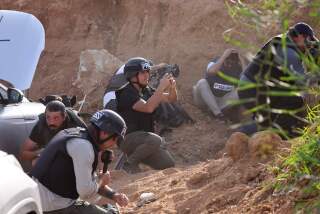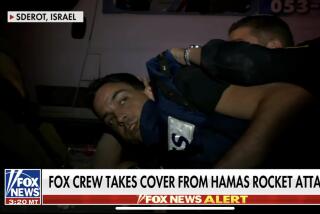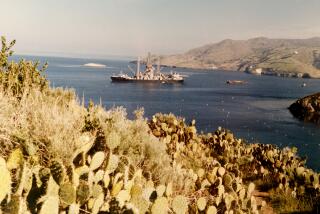The Flow of Combat News Was a Strangled Trickle : Media: The sequestering of reporters after the Panama invasion proves the Pentagon’s openness to coverage a sham.
- Share via
Two hours before U.S. troops began their combat assault in Panama, 16 reporters and photographers lifted off from Andrews Air Force Base aboard an Air Force C-141. Their mission was to cover the fighting and to share with all media their reports, photographs and video of this historic event in U.S. history.
The concept of a press pool to cover such military operations was conceived after the 1983 invasion of Grenada, during which the news media were completely and apparently deliberately frozen out. A Pentagon commission concluded that prohibiting press coverage in Grenada was improper and recommended that in future combat situations, military commanders should make provisions for at least a small pool of journalists to witness, record and document the action. The commission’s report was adopted as official Pentagon policy.
Now the combat phase of Operation Just Cause is over and it can be said with certainty that the policy is being ignored. The Pentagon is not living up to its agreement with the American media or, by extension, the American people and their right to know.
As pool television correspondent Fred Francis said in his after-action report, “The pool was repeatedly denied or ignored when it asked for access to front-line troops, wounded soldiers--simple interviews.” Denied access to the combat area, the pool was virtually sequestered at the Quarry Heights military facility during the first 36 hours of fighting. Less than two miles from Quarry Heights, American soldiers were moving in on Noriega’s headquarters, which was ablaze. When pool members asked to go there, they were told that it was “too dangerous.” When Francis tried to interview an Army major general whose paratroops had seized the international airport, the officer said, “Sorry, my operational orders are that I cannot let you talk with any of my men. I can’t speak with you.”
The press pool did not produce one eyewitness account, one still picture or even 10 seconds of television video that showed how American forces successfully completed their mission.
The day after the invasion began, the Pentagon, apparently thinking the situation was “well in hand,” authorized the press to charter an L-1011 to fly 169 more journalists, including me, and about 25,000 pounds of electronic gear into Howard Air Force Base. We were greeted by a wide-eyed master sergeant, apparently astounded by the size of our contingent, who explained that we would not be allowed into Panama City because roving gangs of Noriega’s “Dignity Battalions” were still at large, certainly a legitimate reason. But if the situation was not under control, why was the trip authorized?
For two days we were uncomfortably locked up in a recreation center on the air base. Finally, the military said the influx of journalists was too much to handle and most of us were airlifted back to the United States with nothing to show for the trip.
There is official documentation of Operation Just Cause, but even that is currently being withheld. Defense Department combat photographers were allowed to go along with the invasion force, but according to Robert Hall, an aide to Secretary of Defense Dick Cheney, the combat photography is “for internal use.”
What kind of a public information policy is this? Just Cause was the biggest military operation since Vietnam, conducted in a country where the United States government has had a considerable presence since the digging of the Panama Canal. Some within the press ranks believe there is a deliberate policy--that the Bush Administration wants to manage the news and that the Pentagon views the press as hostile. I’m not sure. But either through official design or incredible ineptitude, the American press was not allowed to do its job. The traditional eyewitnesses to history were blindfolded and a free society was not well served.
More to Read
Sign up for Essential California
The most important California stories and recommendations in your inbox every morning.
You may occasionally receive promotional content from the Los Angeles Times.










